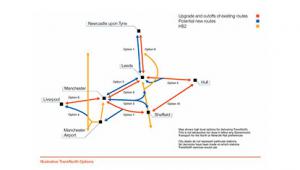By Richard Johnstone | 31 March 2014
Network Rail has today begun the implementation of a five-year £38bn investment programme that will include a major upgrade to railways in the north of England.
The plan, agreed with ministers, devolved administrations and the Office of Rail Regulation, runs until to the end of March 2019 and aims to cut costs by 20%. This could reduce the annual government subsidy from around £4bn in 2013/14 to £2bn in five years time.
Agreed spending includes £13bn for upgrades such as a host of improvements to increase capacity and cut journey times around Manchester in the Northern Hub scheme. Electrification of three lines is also planned: the Midland mainline between London and Sheffield, the Great Western mainline from Maidenhead to Swansea and trans-Pennine services in the north of England.
By the end of the programme, known as Control Period 5, the upgrade to the cross-London Thameslink line will be finished and construction of Crossrail in the capital will also have been completed.
Transport Secretary Patrick McLoughlin said the government was committed to investing in infrastructure as part of its economic plan. ‘That is why we are putting record amounts of government funding into our railways over the next five years.
‘That investment will generate growth, create jobs and boost business while delivering faster journeys, greater comfort and better punctuality for passengers across the UK.’
Network Rail chief executive Mark Carne said the firm would spend the money allocated to it wisely.
‘We are good at delivering projects both great and small and at providing a safe and reliable railway but want to do even more for the people that rely on our railway network.
‘This investment responds to the growth and demands being placed upon us by delivering bigger, better stations, more trains and seats, reopened railway lines and fewer level crossings.’
Office of Rail Regulation chief executive Richard Price added that the watchdog would scrutinise implementation closely.
‘Network Rail – working with ORR, the governments, the rail industry, customers and members of the public – has developed a comprehensive multi-billion pound plan detailing how it will achieve a better railway for Britain. ‘Now it is time for the company, in collaboration with the industry, to make it happen.’





















